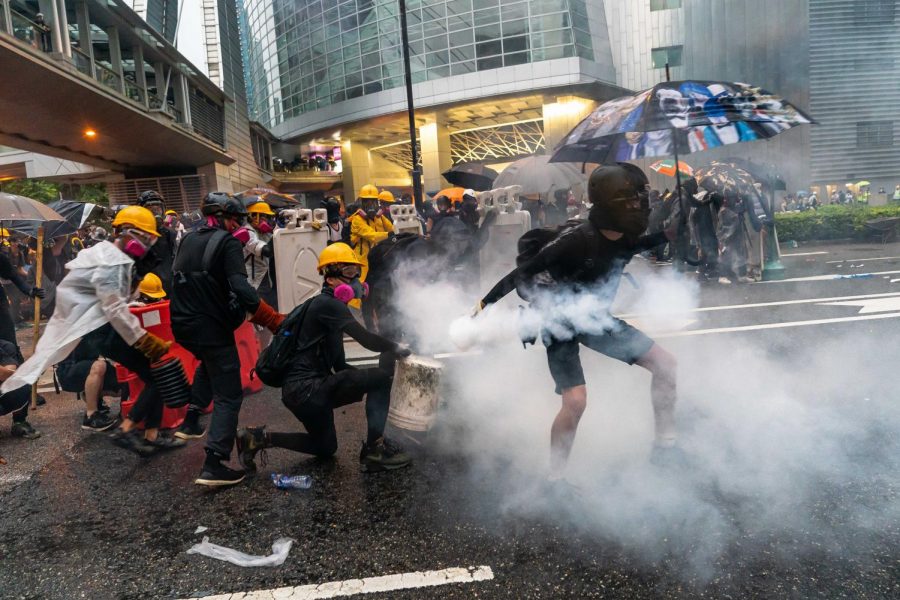This past summer I was able to take a trip I had dreamed about my entire post-infantile-amnesia life. My mom’s side of the family is from Hong Kong, and I grew up hearing the often magical stories about the city and was not able to visit it until this year. It was also the same summer that is now dubbed Hong Kong’s Summer of Discontent.
On a Sunday night, a friend and I sat on the same side of a table in a dimly lit and mostly empty restaurant on the popular Wellington Street in Hong Kong. We left the other side of the table purposefully open and available to outsiders and locals who might be able to tell us about the next day’s expected rally. The next day was July 1, also known as Establishment Day in Hong Kong, a holiday that celebrates the 1997 handover of Hong Kong from the United Kingdom to the People’s Republic of China and that established Hong Kong as the Special Administrative Region (SAR) it is fighting to preserve. That’s what many miss about the Hong Kong protesters: They are conservative. They want to conserve what they have, what one might even call the last shreds of democracy in China.
A quick recap: The protests began in April of this year in response to the Hong Kong extradition bill being introduced, a bill that said criminal suspects in Hong Kong could be extradited to mainland China. Anyone, even visitors in the city, could be extradited to mainland China, where they would face their deeply-flawed judicial system. Since then, hundreds of thousands, and at times, millions, have marched and protested in Hong Kong. After the first few weeks of protests, the extradition bill was suspended indefinitely, but Hongkongers, continued to protest, demanding more rights.
Months ago, before many egregious acts of violence and corruption from the Hong Kong police, the protesters asked for one thing: a withdrawal of the extradition bill. After 1,183 arrests, four suicides, countless injuries, and 14 weeks (and counting) of protests, they now ask for five key demands: a fair investigation into the police’s violence, amnesty for those arrested, a stop to classifying the protests as riots, universal suffrage, and a withdrawal of the bill. All five key demands are rights every human being deserves.
Earlier this month, Chief Executive of Hong Kong Carrie Lam withdrew the bill. But she’s too late. Months have passed and the streets have been bloodied, literally. Video evidence shows police being friendly with hundreds of white-clad anti-protesters who attacked not only protesters, but random civilians too. Police have shot rubber bullets at civilians at point-blank range, released more than 2,350 canisters of tear gas, and one volunteer medic has even possibly lost sight in one eye permanently. Tensions between civilians, police, and the government cannot be mended with just a withdrawal of the bill and only one of the five key demands being met. While Lam has spent months deciding her next move, the Hong Kong people have been ravaged by police brutality.
In the event that all the five key demands are met, Lam should still resign, as there is no way to seek forgiveness for what has happened now. The amount of violence carried out by the police against protesters is uncalled for. They have shown their response to the cry of civilians is to equip police with more advanced weapons and increase violence.
And yet, China’s mobilization of army forces in Shenzhen, just across the Hong Kong and mainland China border seems reluctant to enter Hong Kong. Although many major Chinese cities have developed explosively within the last few years, China still needs Hong Kong’s financial leverage. As stated earlier, it is a Special Administrative Region, and as such is one of the most important pipelines for money coming into and out of China. Foreign investors have more trust in Hong Kong than they do in the rest of China. Additionally, Hong Kong aids in one of Xi Jinping’s most hopeful projects for China, the Belt and Road Initiative, a plan by the Chinese government to develop infrastructure and investments in various countries and international organizations.
Even now, I write this next sentence with a sense of paranoia because on my way to Hong Kong this summer, I had to enter Beijing airport’s facial-recognition system. But it needs to be said: China needs Hong Kong, and Hong Kong doesn’t want to become another city in China. They want to stay as Hongkongers, with all the democratic-rights afforded to them in the past that every society should have.


